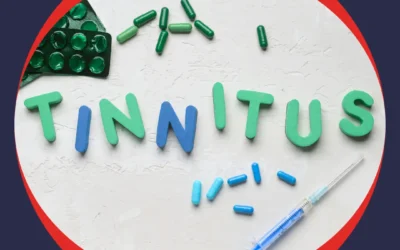Does Ginkgo Biloba Really Help Tinnitus?
Tinnitus, the ringing or buzzing in the ears, can be a frustrating and constant issue. Many seek relief through natural remedies. We’re exploring the connection between Ginkgo biloba and tinnitus, helping you make informed decisions about your hearing health.
Find the answer to the question, “What is hearing health?”
Understanding Tinnitus
Tinnitus is the perception of sound without an external source. People describe it as ringing, buzzing, hissing, or clicking. Around 10-25% of adults experience tinnitus, which becomes more common with age. Potential causes include damage to inner ear hair cells, earwax buildup, head injuries, and certain medications. Symptoms range from constant to intermittent sounds and can consist of hearing loss, trouble concentrating, and difficulty sleeping. While there’s no cure, treatments like sound therapy, relaxation techniques, hearing aids, and medications can help manage symptoms.

Ginkgo Biloba: An Herb on Trial
This is one of the oldest living tree species used for centuries in traditional medicine. It’s a popular herbal supplement in the US and Europe, often touted for its potential health benefits. Here’s a deeper look into this ancient herb and its modern-day applications:
Historical Use:
Ginkgo has a long history of use, particularly in Chinese medicine. Historically, it has been used to treat various ailments, including blood disorders and memory issues. Today, people recognize its potential to enhance cognitive function and circulation.
Components and Properties:
Ginkgo leaves contain two types of beneficial compounds: flavonoids and terpenoids. Flavonoids are potent antioxidants that protect the body from oxidative stress by neutralizing harmful free radicals. Terpenoids, such as ginkgolides and bilobalide, improve blood flow by dilating blood vessels and reducing blood stickiness.
Cognitive Benefits:
Laboratory studies suggest that Ginkgo biloba can enhance memory and cognitive function. It’s believed to increase blood flow to the brain, which may help improve mental performance and potentially delay the onset of age-related cognitive decline. Some studies indicate that it might help treat dementia and Alzheimer’s disease, though results are mixed, and more research is needed.
Circulatory Benefits:
Ginkgo biloba is known to improve circulation, so it’s often used to treat conditions related to poor blood flow. Enhancing blood flow to the limbs may help alleviate symptoms of peripheral artery disease and reduce the discomfort of intermittent claudication.
Antioxidant Effects:
Ginkgo biloba’s antioxidant properties help protect cells from damage caused by free radicals. This protection is critical in the context of aging and diseases like heart disease, cancer, and neurodegenerative conditions. By fighting oxidative stress, Ginkgo may support overall cellular health.
Potential Benefits for Eye and Vein Health:
Some evidence suggests that Ginkgo biloba can support eye health, particularly in conditions like glaucoma and age-related macular degeneration. Its ability to improve blood flow and reduce oxidative stress may also benefit vein health, potentially alleviating conditions like varicose veins.
Mechanisms of Action:
- Improved Blood Circulation: Ginkgo biloba enhances blood flow by dilating blood vessels and reducing blood viscosity. This increased circulation can deliver more oxygen and nutrients to various tissues, including the inner ear.
- Neuroprotective Effects: It may protect nerve cells from damage, necessary for maintaining auditory health.
- Antioxidant Properties: Binkgo can protect inner ear cells from damage by reducing oxidative stress.
- Impact on Neurotransmitters: Some studies suggest that Ginkgo may influence neurotransmitter function, potentially improving communication within the nervous system.
Ginkgo biloba is a widely used herbal supplement with potential benefits for cognitive function, circulation, and cellular health. While it shows promise, particularly in improving blood flow and protecting against oxidative stress, more research is necessary to fully understand its efficacy and mechanisms of action. Always consult with a healthcare provider before starting any new supplement regimen.
Ginkgo Biloba and Hearing Health
It is used in clinical settings to treat inner ear disorders like hearing loss, dizziness, and tinnitus. It may improve inner ear circulation by dilating blood vessels and increasing blood flow to the ear’s tiny capillaries and hair cells. Its antioxidant properties could reduce inflammation and protect against oxidative stress. Some studies suggest it might also improve neurotransmitter function, aiding balance signal processing from the vestibular system.

Research on Ginkgo Biloba and Tinnitus
Studies on its effectiveness for tinnitus have mixed results. Some research indicates it might reduce tinnitus symptoms, while other studies find no significant benefit. For example, a study by Chauhan et al. found that Ginkgo biloba, combined with antioxidants, improved tinnitus severity and quality of life scores. However, the effectiveness of different Ginkgo preparations varies, and more conclusive research is needed.
Potential Side Effects of Ginkgo Biloba
While it usually has a few side effects, some people report stomach upset, headaches, skin reactions, and dizziness. It may increase the risk of bleeding, especially if taken with blood-thinning medications. Pregnant and breastfeeding women, people with epilepsy, and those with diabetes should avoid Ginkgo biloba without medical advice.
Is Ginkgo Biloba a Miracle Cure?
It is not a miracle cure for tinnitus. While some studies show promise, research is inconclusive. Individual responses to Ginkgo biloba can vary based on the cause of tinnitus, dosage, and personal biochemistry. It might not address the root cause and may only offer symptomatic relief. However, it could complement established tinnitus management techniques if deemed safe by a doctor.
What Supplement is Best for Tinnitus?
There is no single “best” supplement for tinnitus; the effectiveness of supplements varies by individual. While Ginkgo biloba shows potential, more research is needed. Supplements can interact with medications, so consulting a doctor is essential.
What is the Best Herb for Tinnitus?
Other herbs, such as Açaí and Korean Red Ginseng, have been studied for tinnitus relief. While some studies suggest benefits, more research is needed. Always consult a healthcare professional before trying new herbs.
Other Ways to Help Tinnitus
Several approaches can help manage tinnitus:
- Hearing Aids: These devices amplify external sounds, making tinnitus less noticeable. They are especially helpful for those with hearing loss. Some also have tinnitus programs to help alleviate symptoms. Discover more about the best hearing aids for tinnitus.
- Sound Therapy: White noise machines or tinnitus maskers create background sounds that mask tinnitus.
- Relaxation Techniques: Yoga, meditation, and deep breathing can reduce stress, which can worsen tinnitus.
- Cognitive-Behavioral Therapy (CBT): CBT helps change negative thought patterns and emotional responses associated with tinnitus.
- Dietary Changes: Reducing salt intake and avoiding caffeine and alcohol might help some individuals.
- Exercise: Regular physical activity can improve overall well-being and reduce stress.
- Acupuncture and Hypnosis: These alternative therapies might provide relief for some people.
- Tinnitus Retraining Therapy (TRT): This combines sound therapy with counseling to help habituate the brain to tinnitus, reducing its perceived loudness and annoyance.

Consulting a Hearing Health Professional
It’s crucial to consult a doctor or audiologist before using any supplements for tinnitus. They can evaluate your tinnitus, discuss supplement options, and develop a personalized management plan that may include sound therapy, relaxation techniques, dietary changes, and hearing aids.
Ginkgo biloba shows promise for tinnitus treatment, but more research is needed. It’s not a guaranteed solution, but it might help some individuals as part of a comprehensive plan. Contact American Hearing + Audiology for expert tinnitus management and personalized care.



